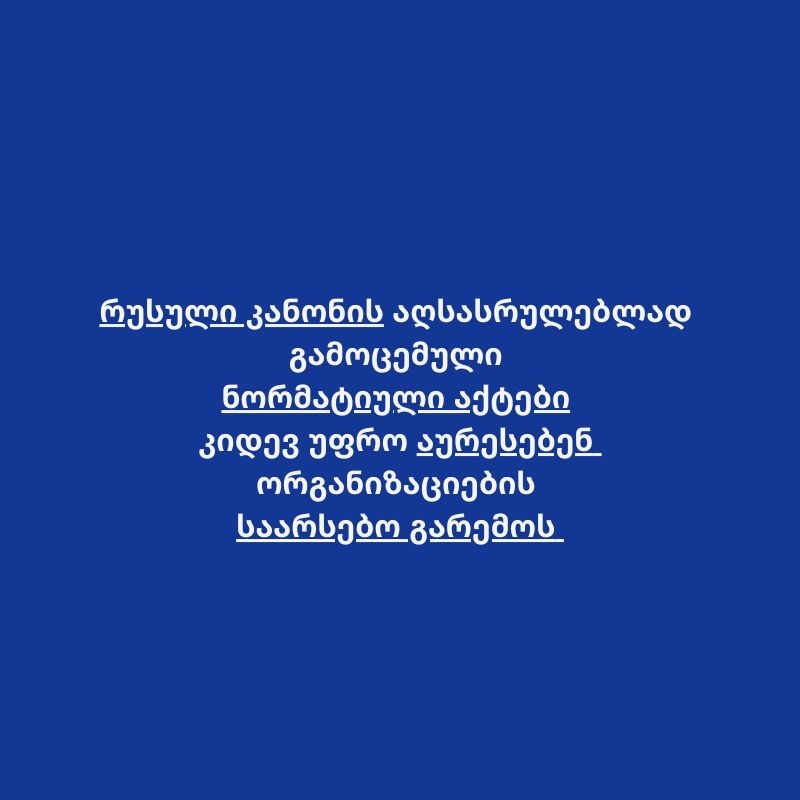Normative acts issued to enforce the Russian law further deteriorate the living environment for organizations
Popular





On August 1, 2024, the order of the Minister of Justice of Georgia was published. This order outlines the rules for the creation of the registry, the submission of financial declarations, and the monitoring procedures based on the "Russian law" on the transparency of foreign influence.
Before that, on July 29, the Minister of Justice of Georgia issued an order to create a new unit within the National Public Registry Agency called the Financial Declaration Department. Among other responsibilities, this department will be tasked with producing and publicizing the “Register of Organizations Pursuing the Interests of a Foreign Power”.
It should be noted that a significant portion of civil society organizations do not plan to voluntarily register in the mentioned register or submit financial declarations, as they believe these requirements are not about transparency but rather about discrediting the organizations. However, the law's requirements may also pose challenges for those organizations that are considering registering.
The financial declaration defined by the normative act issued by the Minister of Justice on August 1st requires organizations to submit, among other obligations, detailed identification data about all individuals associated with the organization for whom any expenses were incurred during the reporting period. Notably, this requirement also applies to individuals who provide funding. This applies to the 2023 data as well, the collection of which, under the new rules, poses significant challenges for many organizations.
Gathering and processing the mentioned information, due to its volume and sensitivity, as well as the need to mobilize additional human and financial resources, may pose significant challenges for many organizations. This could potentially lead to the disruption of these organizations and the interruption of their work.
In addition, seeking such detailed information in the future may erode trust in the process among beneficiaries, which could be particularly damaging to service providers and organizations working with vulnerable groups, ultimately significantly hindering their work.
It is also worth noting that the "Russian Law" gives organizations a one-month deadline to submit a written application for registration as an organization pursuing the interests of foreign powers. After that, within 2 days, the organization will gain access to the "proper website," where it must complete an application within 10 working days. This application also serves as the financial declaration.
Based on this, the law allows approximately one and a half months for the preparation and submission of the declaration. If an application is incorrectly or incompletely filled out, the organization must correct the defects within 10 working days.
For comparison, business entities are given 9 months for reporting under the law of Georgia On Accounting, Reporting and Audit. Interestingly, when changes to the reporting rules for business entities were introduced—which differ in essence from those for civil society organizations and the media—the preparatory period lasted two years. During this time, the state also provided information and guidance about the changes.
Shortened deadlines for completing and submitting financial declarations pose an additional obstacle for organizations and negatively impact their operations.In addition, those requirements suggest that the purpose of the law's implementation may not be to ensure the transparency of organizations but to hinder their work.
Finally, the mentioned requirements—along with existing and future difficulties related to searching for and processing information, and the shortened deadlines for submitting the financial declaration—will negatively impact the work of civil society actors who either voluntarily register or intend to submit the declaration after the state registers them in the registry. This may ultimately lead to the suspension of their activities.
These difficulties further deteriorate the operating environment for civil society organizations and hinder their ability to provide advocacy and services.








